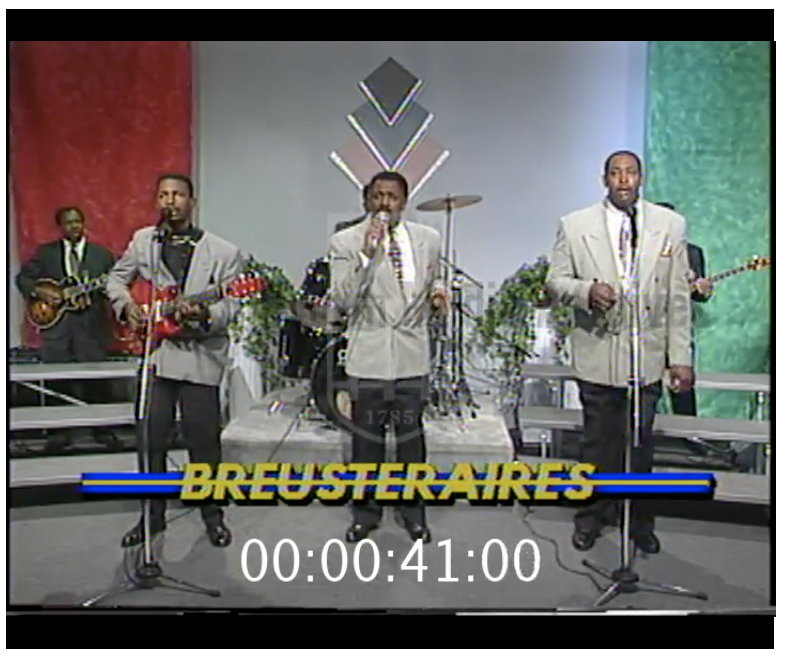The Digital Library of Georgia has partnered with the Brown Media Archives and Peabody Awards Collection at the University of Georgia Libraries to digitize part of its collection of Parade of Quartets. This gospel program has aired on WJBF-TV in Augusta, Georgia, for more than 50 years. The collection is available at https://dlg.usg.edu/collection/ugabma_poq.
The footage, which documents decades of regional gospel music performances, religious practices, and political activities. Ruta Abolins, director of the Brown Media Archives and Peabody Awards Collection, notes that these materials are “part of the largest collection of gospel performance footage at any North American library.”
Parade of Quartets, broadcast on WJBF-TV in Augusta, Georgia since 1954, is a rare example of a sustained African American media presence on a southern television affiliate. Hundreds of well-known Black gospel musicians such as Shirley Caesar, Dottie Peoples, the Mighty Clouds of Joy, the Dixie Hummingbirds, and the Swanee Quintet have appeared on the program. In the last few decades, the program’s content has expanded to include local and national African American political leaders’ appearances. Some of them appear in the digitized materials, which cover the period from 1980 to 2011.
This content serves the study of gospel music, religious broadcasting, African American programming, African American community outreach and organization, local television programming, African American politicians, entertainment, musicology, performance studies, African American studies, Southern studies, civil rights history, journalism and media studies, and business.
Dr. Barbara McCaskill, professor of English, associate academic director of the Willson Center for Humanities and Arts, and co-director of the Civil Rights Digital Library at the University of Georgia, said that the collection of shows documents a broad spectrum of essential aspects of life for African Americans in the South.
“The name ‘Parade’ in the program’s title alludes to the pageant tradition in Afro-Protestant churches. At Christmas, Easter, and church anniversaries, youth and adults perform brief skits of Bible parables and lessons, sing spirituals, and recite Bible verses,” she said. “Rooted in this important Afro-Protestant pageant tradition, which combines oration, song, and performance in a unique form of worship, Parade of Quartets exemplifies how black Christians used the new medium of television to agitate for social change and honor their communities, as well as showcasing local and regional black gospel artists.
“Secular-themed church pageants commemorate the patriotism and military service of African American men and women. Additionally, they laud the contributions of African American individuals, communities, and organizations,” she explained. “Many of the artists who guested on the show pitched advertisements for black-owned businesses. So Parade of Quartets is also valuable evidence that southern African Americans recognized the power of television to build community wealth and multigenerational financial stability.”
McCaskill concludes, “For its connections to the Afro-Protestant pageant tradition, its dual functions as an example of musical innovation and civil rights activism, and its effectiveness as a lever for African American business growth, Parade of Quartets is a national treasure.”
Karlton Howard, who has produced and hosted Parade of Quartets for more than thirty years, adds: “The Howard Family and Parade of Quartets are eternally grateful to the Brown Media Archives & Peabody Awards Collection for the gift of preserving portions of the video history of Parade of Quartets. Your kindness will ensure that the culture of the African American gospel quartet will be enjoyed and cherished for generations to come.”
Link to featured images:

(Still shot of the African American gospel group the Bruesteraires performing on Parade of Quartets)

(Still shot of Georgia state representative and former Parade of Quartets host Henry Howard)
About the Walter J. Brown Media Archives and Peabody Awards Collection
The Walter J. Brown Media Archives & Peabody Awards Collection is home to more than 90,000 titles and 5,000,000 feet of newsfilm, making it the third-largest broadcasting archive in the country, behind only the Library of Congress and UCLA. The Archives comprise moving image and sound collections that focus on American television and radio broadcasting, and the music, folklore, and history of Georgia. There are more than 50,000 television programs and more than 39,500 radio programs in the Archives, in addition to audio folk music field tapes and home movies from rural Georgia. Their mission is to preserve, protect, and provide access to the moving image and sound materials that reflect the collective memory of broadcasting and the history of the state of Georgia and its people. Learn more at libs.uga.edu/media/index.html.
About the Digital Library of Georgia
Based at the University of Georgia Libraries, the Digital Library of Georgia is a GALILEO initiative that collaborates with Georgia’s libraries, archives, museums and other institutions of education and culture to provide access to key information resources on Georgia history, culture, and life. This primary mission is accomplished through the ongoing development, maintenance, and preservation of digital collections and online digital library resources. DLG also serves as Georgia’s service hub for the Digital Public Library of America and as the home of the Georgia Newspaper Project, the state’s historic newspaper microfilming project. Visit the DLG at dlg.usg.edu.

